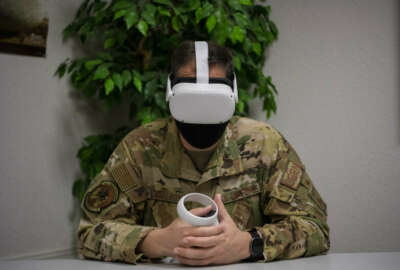Best listening experience is on Chrome, Firefox or Safari. Subscribe to Federal Drive’s daily audio interviews on Apple Podcasts or PodcastOne.
The Defense Department is facing a reckoning when it comes to sexual assault and harassment in the military. The Air Force is now employing new technologies in its prevention training in hopes of combating fatigue and getting airmen to retain knowledge better.
Air Mobility Command (AMC) is piloting a virtual reality program for its military and civilian employees’ mandatory sexual assault prevention and response training (SAPR).
“The goal is of this training is to create an immersive, engaging training where airmen are not on their cell phones, they’re not zoning out, they’re not texting, they’re actually having to pay attention,” said Carmen Schott, AMC SAPR program manager. “When you’re in the virtual realm, you are there and you have to be involved. You have to be present and use your voice to talk to an airman in need right in front of you. It puts airmen in that experience and helps increase skills and knowledge and abilities on how to answer some of these questions about the sexual assault programs. “
During the training, airmen wear a virtual reality helmet. The headset transports the airman into a lunchroom, where a fellow airman — played by an actor — is confiding in them. The trainee’s job is to convince the actor to get help.
The headset shows different responses for the trainee to use and the actor will react differently to each response.
“It’s very realistic even though it’s virtual,” Schott said. “You look around and you can see everything behind you on the floor. It’s just very real. It’s really amazing. Their voices are there and you’re interacting with them like I would be with you across from a desk or a table.”
The program is currently deployed at Joint Base Charleston in South Carolina and will move to Little Rock Air Force Base in Arkansas later this summer.
The training is a three-part multifaceted curriculum made up of:
- Two 30-minute role-play scenarios intended for all Air Force personnel, in which the group helps a victim of sexual assault connect with appropriate resources as well as practice bystander intervention skills.
- One 30-minute role-play scenario intended for Volunteer Victim Advocates, who provide immediate and ongoing support to victims with resources and information regarding care and reporting options to improve their interaction skills.
- One 30-minute role-play scenario intended for Squadron Leadership to correctly apply Air Force guidance when confronted with evidence of a sexual assault in the workplace.
The service teamed up with Moth+Flame, a virtual reality developer, to create the program.
“This is such an important issue, and by bringing people into environments where they have to confront difficult situations, we can help prepare them for when these scenarios arise in the real world,” said Kevin Cornish, CEO and Founder of Moth+Flame. “The Air Force has been a tremendous partner in working with us to address these complex and serious issues head on with training that improves how people respond to these types of situations.”
The Air Force awarded the contracted through AFVentures’ AFWERX Small Business Innovative Research Program.
The Air Force reported 1,661 cases of sexual assault in its ranks in 2020.
Copyright
© 2024 Federal News Network. All rights reserved. This website is not intended for users located within the European Economic Area.

